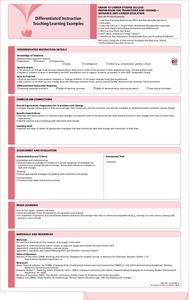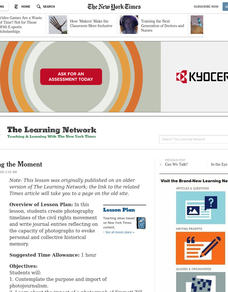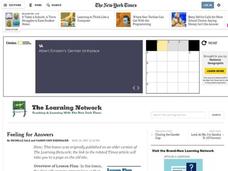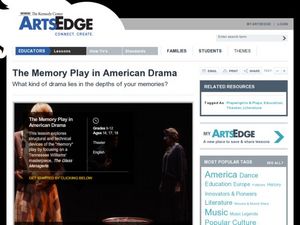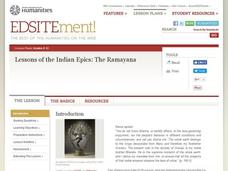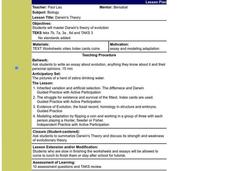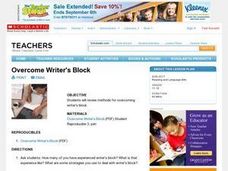EduGAINs
Preparation for Transitions and Change— Guidance and Career Education
Every hopeful in your class has gone through some kind of life change, from parents' divorce to a death in the family to moving up into another grade. Encourage them to discuss these changes, the skills they used and acquired...
Teaching Tolerance
Reflection: What’s Your FRAME?
Encourage your class to recognize the diversity in the beliefs and backgrounds of their peers. Learners use the acronym FRAME to consider culture, background, and life experiences.
Curated OER
Social and Cultural Scene
Ninth graders examine the Imperial Era of Japan. In this World History lesson, 9th graders address the social and cultural aspects or history. students are given various true incidents and should understand that personal stories...
Curated OER
Shifting Gears
In this activity, students will write a personal narrative that is designed to help them reflect on the nature and meaning of change in their lives.
Curated OER
Writing First Drafts (Grades 3-6)
Students examine, experience and practice strategies that assist students in writing an expressive essay. They outline and then write a first draft of an essay to be edited and proofed and then corrected. Each student adds a visual prop...
Curated OER
What's Past is Prologue
Young scholars examine a picture of a Cuban billboard and discuss what the billboard signifies. Students then consider the impact of the end of Fidel Castro's rule by reading and discussing the article ¿What Was Once Theirs.¿ Young...
Curated OER
Me, Myself and I
Students explore symbols of their individual identities and write college admissions essays about the meaning of the symbols. They evaluate the unique and common identities of their classmates through participation in a Step Into the...
Curated OER
Showtime! Profit or Non
Students perform a production. In this job instructional activity, students perform the production they created about jobs in the profit and nonprofit sectors. Students write an essay describing the advantages and disadvantages of...
Curated OER
About Abraham Lincoln
Fifth graders complete a unit of lessons on the life of Abraham Lincoln. They read and analyze a poem, create a timeline, write an essay, research The Gettysburg Address and The Emancipation Proclamation, explore websites, and interview...
Curated OER
Debates in Human Genetics
Pupils examine case studies involving human genetics. They research the case and determine possible problems to the issue. Students write essays supporting their opinion. They debate the ethical issues.
Curated OER
Capturing the Moment
Students create photography timelines of the Civil Rights movement and write journal entries reflecting on the capacity of photographs to evoke personal and collective historical memory.
Curated OER
We and Thee
Students examine class structure. In this diversity education lesson plan, students discuss stereotypes within their school as an introduction to Shakespeare's Romeo and Juliet. After students have read the play and discussed social...
Curated OER
From Whose Perspective?
Students critically analyze news coverage of Palestinian-Israeli violence by comparing information from a variety of news sources. They compose expository essays reflecting on how to obtain accurate, unbiased, and credible information.
Curated OER
Feeling for Answers
Students consider the legal issues related to a suicidal or depressed college student by reading and discussing the article, "Laws Limit Options When a Student Is Mentally Ill." They write essays considering how the events at Virginia...
Curated OER
A Never-Before-Seen Creature
Students construct a never-before-seen creature in part of an analysis of societal injustices and discrimination. In this societal issues lesson, students create a creature called a Man-Droid as a study about the differences among...
Curated OER
The Other Side of Paradise
Eleventh graders explore the life and writing of F. Scott Fitzgerald. They examine the youth culture of the 1920's and compare it to their own. They practice using some of the biographer's or archivist's tools for studying a person.
Curated OER
The Aerial Age
Students infer America's attitude towards aviation in the early 1900s. In this The Aerial Age lesson, students analyze early 1900s literature, music, advertisements, and popular culture in reference to aviation. Students represent their...
Curated OER
The Memory Play in American Drama
High schoolers take a closer look at a memory play. In this American drama lesson, students read Tennessee Williams's The Glass Menagerie and analyze it as a memory play. High schoolers discuss the linear and non-linear aspects of the...
Curated OER
The Fight for Human Rights
Students explore the concept of human rights by developing and defending their own 'Bills of Human Rights' and by writing a reflective essay that compares their notions of human rights and the protection of them.
Curated OER
Design a Reef!
Students design a functional model of a coral reef ecosystem. For this coral reef lesson, students identify the energy sources and material cycles of a coral reef. They write an essay about their niche in their own ecosystem.
Curated OER
Lessons of the Indian Epics: The Ramayana
Students read a version of Ramayana and explore the elements of the epic hero cycle. In this Ramayana analysis lesson, students retell the basic narrative of the Ramayana and identify the main characters. Students identify elements of...
Curated OER
Darwin's Theory
Pupils write an essay about evolution. They summarize Darwin's Theory and discuss its strength and weakness of evolutionary theory. Students discuss the struggle of existence and survival of the fittest. They discuss the evidence of...
Curated OER
Overcome Writer's Block
Young scholars review methods for overcoming writer's block. They are asked if they have ever experienced writer's block, what the experience feels like, and discuss some strategies that they use to deal with writer's block. They are...
Curated OER
Oliver/Kenyon
Students, through two pieces of writing, identify poetic/language devices through the speakers, personification , imagery, metaphor, etc. They assess the patterns those devices are used in and analyze the theme of each. Each student...


